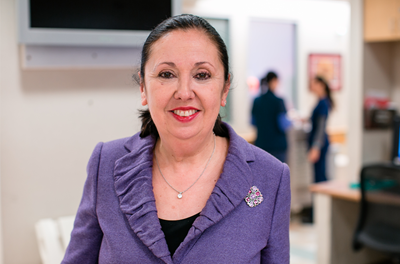Boston had been “home” to Jacqueline Somerville, PhD, RN, for many years before her recent move to Philadelphia to become HUP’s chief nursing executive. But the very things she loved about Boston – “the gritty neighborhoods, the history, the universities, the energy” – she has found again in Philly.

Jacqueline Somerville, PhD, RN, Chief Nursing Executive of the Hospital of the University of Pennsylvania (Photo: Will Connelly)
What drew Somerville to HUP? Certainly the Magnet level of nursing care, but it was also the leadership structures “which make it apparent that each entity and the system understands the value nurses bring to the organization.”
And as one of a few leading universities with both a school of nursing and medicine, she was also drawn to Penn’s opportunities for research and interprofessional education, which “shape the next generation in terms of how we collaborate as a team.”
And then there’s Penn Pride. “It’s a pride in being part of something that’s bigger than you,” she explained. “It’s contributing to a mission that’s changing the health of the community, the country, and the world. It’s infectious.”
Somerville chose nursing as a career because her parents expected her to do something “in service to community,” but she knew she had made the right choice after she was hospitalized during her freshman year at college. “I saw how smart nurses were, how they used knowledge and science to inform my care. They wanted to know who I was as a person.”
This nurse/patient relationship has defined Somerville’s entire career. “As a bedside nurse, if I understood that which held meaning for a patient, I could make a difference in their care,” she said. “The nurse/patient relationship is paramount to healing. If you create a caring, healing environment, you can advance better patient outcomes and a better workforce environment.”
The Future of Nursing
While there will always be a need for hospitals like HUP that provide a quaternary level of care for serious illness, Somerville sees nurses’ roles evolving as more care is delivered in outpatient settings. “The next generation of nurses will need a different skill set as we move care into the communities, into patients’ homes. Nurses will be a huge part of that transformation.”
She would also like to further recognize and advance the nurses’ role in patient outcomes. “Nurse-driven protocols or nurse-sensitive outcomes impact not only the overall health of patients but the health system as well – decreasing complications, readmissions and costs.”
Since arriving at HUP to take up the reins as CNE, Somerville has been spending time on units, shadowing nurses and getting a better understanding of what it means to be a HUP nurse. “I’m on a listening tour,” she said. “Nurses are proud to work at Penn. I am asking them to share all of the reasons why they feel this pride so I can celebrate their contributions and practice, and discover how I can best be of service to them and to their patients, families, and communities.”